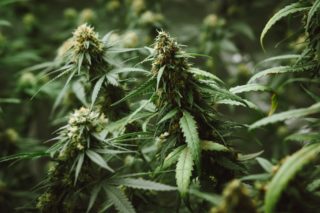Is Marijuana Really Addictive?
The most common misconception is that marijuana is not habit-forming. Research demonstrates that at least 1 in 10 young people using marijuana will develop CUD. Young people who are not yet able to control their inhibitions at 100% yet may get carried away with the euphoric feeling produced by THC. Once that feeling becomes ordinary to them, they may be tempted to try other drugs which can present serious risk.
Another concern with marijuana use is that illegally obtained marijuana may also come combined with other highly addictive drugs in it. This is often unbeknownst to the user and can cause serious dependency issues. Using marijuana occasionally is not likely to result in addiction, but continued or frequent use of marijuana can become addictive, particularly in young individuals.
How Does Marijuana Work?
When smoked, marijuana travels through the bloodstream straight to the brain. It then blocks neurotransmitters, preventing communication from the brain to the body. This results in delayed reflexes and response time. THC travels through the bloodstream very quickly, resulting in a very quick high. Most of the effects wear off a short time later.
When marijuana is consumed in food, the effects may take longer to affect the individual. It can take anywhere from 30 to 60 minutes but the effects will be similar. Consuming marijuana through food produces feelings of euphoria, delayed reflexes, and sudden temporary memory loss, which are also effects felt when marijuana is smoked.
During the brain’s developmental years—prior to age 18—the effects of marijuana can be heightened. They may also cause longer-lasting effects, if not permanent. It is more likely to develop permanent memory loss or difficulty learning when marijuana is misused at a young age.
How Do Marijuana Effects Affect Teens and Young Adults?
When marijuana is smoked, the effects can be nearly immediate. The individual smoking will get feelings of euphoria as tetrahydrocannabinol (THC), the psychoactive ingredient in marijuana, enters the bloodstream and begins to block neurotransmitters in the brain from communicating with one another. THC blocks the communication from the brain to the body, delaying reflexes and allowing the user to feel mellow and relaxed.
In some people, THC can have an opposite effect. For some, marijuana can actually increase feelings of anxiety, panic, or depression. In the short term, the user will experience memory problems and difficulty controlling inhibitions. Under the influence of marijuana, users may find themselves making poor decisions with side effects that will affect them later on, like practicing unsafe sex or participating in other high-risk activities.
What Are Marijuana High Symptoms?
If you are wondering what the symptoms of marijuana intoxication are, there are some key symptoms to look out for that can help you figure it out. Here are the signs and symptoms that your child may be high on marijuana:
- Red, bloodshot eyes
- Slow reflexes
- Difficulty answering simple questions
- Delayed reactions and responses
- Increased appetite
- Increased anxiety or paranoia
- Sudden inexplicable fear or panic
- Difficulty sleeping
- Hallucinations
If you suspect your child is smoking marijuana, you should look out for these symptoms. You can also ask your child to walk in a straight line or perform simple actions. Lack of coordination is also a sign that your child may be high on marijuana.
What Are the Signs of Marijuana Addiction?
How can you tell if you or a loved one are addicted to marijuana? Marijuana addiction is not as common as other addictions, but it is definitely possible to develop an addiction to marijuana. Marijuana addiction can become more apparent as it begins to impact everyday functioning. For example, if those who are addicted to marijuana find themselves unable to complete regular tasks like going to school or work or interacting normally with friends and family, they may be addicted.
Marijuana addiction may also negatively impact people who already suffer from mental health problems. If symptoms of depression, anxiety, or any other mental health condition worsen due to excessive marijuana usage, this could mean the user is addicted. If you find yourself unable to stop using marijuana then you may consider yourself to be addicted to the substance. Frequent marijuana high symptoms may also be a sign that you or a loved one is addicted.
What Are the Effects of Marijuana Misuse?
The effects of marijuana are mainly short-term marijuana high symptoms, but repeated use can result in some long-term side effects as well. Repeated misuse of marijuana can lead to a decreased IQ. Some neurotransmitters may not recover from the continued use of marijuana. Suicidal thoughts and depression are among a few of the mental health conditions that can be worsened by continued marijuana use.
Pregnant women should not use marijuana during pregnancy as it may have adverse effects on the developing fetus, some of which may irreparable. In addition, frequent use of marijuana can cause impairment when driving or operating any type of machinery. If you are caught driving under the influence of marijuana, you will be subject to fines or jail time.
Some marijuana high symptoms and effects use can also lead to more permanent forms of memory loss and make it difficult for users to learn in the future. Occasional use will likely not result in such disastrous side effects but frequent use or misuse of marijuana can lead to these lifelong consequences. Regular marijuana users are less likely to graduate from high school and much more likely to develop a secondary, more dangerous drug addiction.
Marijuana Withdrawal Symptoms
If you or your loved one is withdrawing from the frequent use of marijuana, there will be some side effects to the detoxification process. The side effects can be very different from marijuana high symptoms. Marijuana can remain in your bloodstream for one to three months, though the side effects of withdrawal should not last that long. In general, withdrawal symptoms should dissipate or improve in one to three weeks. Here are some of the most common symptoms of marijuana withdrawal:
- Uncontrollable mood swings
- Reduced appetite
- Irritability
- Insomnia
- Headaches
- Sweating
- Cold sweats
- Body chills
- Upset stomach
- Worsened depression
- High anxiety
- Digestive troubles
Those who suffer from mental health disorders may experience worse symptoms, but this is temporary. It is important to seek the help of a mental health professional when dealing with drug addiction and mental health issues. If your child suffers from mental health issues or has struggled with suicidal thoughts, it is important to seek help for them sooner rather than later. This can help minimize the effects on your child’s mental health problems.
How Do I Know if My Child Needs Help?
The first step once you have determined that your child is frequently showing marijuana high symptoms is to determine how often they are using it. If it is recreational use, you can likely deal with this issue as a family privately. If your child is abusing marijuana, you may want to consider reaching out for help from a rehabilitation center like Windward Way Recovery.
If your child is smoking marijuana regularly, is often impaired, and/or their social and academic life are suffering because of it, they are likely addicted to marijuana. It is more common for teens to become to addicted to marijuana prior to the age of 18.
If you suspect your child or teen has developed an addiction to marijuana, you should start by contacting a rehabilitation center to find out what you can do to help support your child through the recovery process. Windward Way Recovery can help you and your child understand the importance of kicking the habit and how to do so successfully. We can also provide you both with the support and guidance you need to maintain a successful recovery in the future.
Can Drug Rehabilitation Therapy Help with Marijuana Addiction?
There is a misconception that marijuana is not a, “real,” drug and people are not able to get addicted to it, but this could not be further from the truth; substance abuse disorders can come in many shapes and forms. Various addictions all have similar foundations and treatment methods. Individuals struggling with addictions are facing the same struggles with quitting and the same difficulties with maintaining a functional life because of their addiction.
Windward Way Recovery offers a wide variety of rehabilitation therapies including individual therapy, group therapy, and family therapy when requested by the individual. Each therapy program can work in different ways to help those suffering with a substance abuse disorder to find their path to recovery. The road to recovery from addiction is different for everyone and it is important to find the strategy that works best for you. In many cases, a combination of therapies can work very well in helping individuals uncover their true potential and finding their way to recovery.
Is Rehabilitation Right for Me?
If you are struggling with an addiction to marijuana or another substance, call Windward Way Recovery today. The journey to recovery is a long one, but you can do it and you do not have to do it alone. Recovery is an individual journey, but with the right support system around you, you can build up the strength and courage it takes to finally say goodbye to your addiction. Windward Way Recovery is there for you every step of the way. One day at a time, you can do it. We can help.






